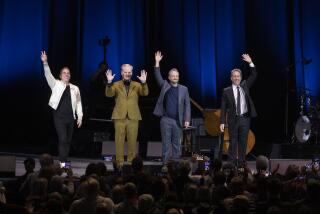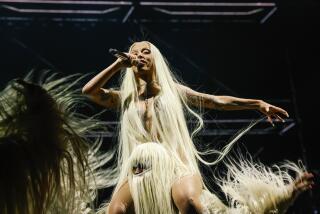Moby’s Malibu mashup
- Share via
Thursday night at the Malibu Performing Arts Center, Moby presided over what Nic Harcourt of KCRW called “a partially seated rave.” Harcourt hosts “Morning Becomes Eclectic,” one of the Santa Monica public radio station’s most popular programs, and Thursday’s event was the second in a new benefit series called KCRW Sessions, which Harcourt said aims to present “Morning Becomes Eclectic” onstage. (The series began in April with a performance by Australian singer Sia.)
For Moby, that meant sitting for an interview with Harcourt and re-imagining his music -- a product of spending his formative years in the techno and hard-core punk scenes -- for 500 public-radio types who were comfortably reclined.
The interview seemed like a piece of cake. Because he’s a baldheaded vegan from New York City, Moby has accrued a reputation as something of a humorless killjoy. Yet in conversation with Harcourt he was witty and self-effacing: He admitted that the first record he bought, C.W. McCall’s mid-’70s novelty hit “Convoy,” prompted him to roam his elementary school halls talking like a trucker, and he remembered with amazement the time he had David Bowie over for an impromptu jam session.
The performance portion of Thursday’s show wasn’t quite as successful. Since he first appeared on the national radar with his 1992 single “Go,” Moby’s musical output has been defined by his huge stylistic appetite; this guy wasn’t given the name of the white whale just because he’s related to Herman Melville. Throw on a Moby record and you’re as likely to encounter a sentimental ballad as you are a funky hip-hop track or a post-punk blast.
In the studio, Moby is a skilled craftsman, which enables his genre experiments to transcend their circumstance. In Malibu, though, that willful eclecticism -- the set list included material from throughout Moby’s discography -- got the best of him and his five-piece band; too much of the music sounded like a gesture at some form rather than the form itself. (“This next one is a disco song,” Moby said before “Disco Lies,” assuming -- perhaps correctly -- that we might not have known otherwise.)
The musicians were most convincing during selections from “Play,” Moby’s smash 1999 set of gospel-influenced electro-blues. “Play” draws its power from Moby’s mixing-board finesse, yet Thursday he (and singer Laura Dawn especially) connected the music back to its roots in live performance.
Moby closed the two-hour show with “Honey,” tweaking the song’s arrangement with a juke-joint groove that at one point morphed slyly into Led Zeppelin’s “Whole Lotta Love.”
For a few minutes, the partially seated rave became the real thing.
More to Read
The biggest entertainment stories
Get our big stories about Hollywood, film, television, music, arts, culture and more right in your inbox as soon as they publish.
You may occasionally receive promotional content from the Los Angeles Times.











